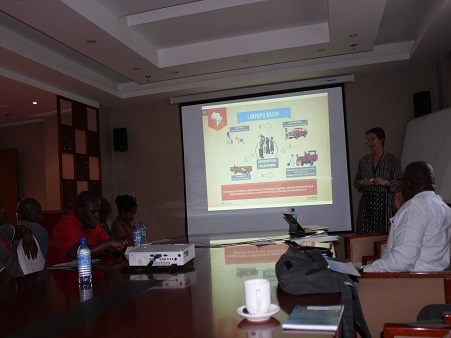The aim of the session was to share key research results from the Challenge Programme for Water and Food (LBDC) which ended in 2013. The session achieved the following objectives through the presentations and discussions:
- By presenting the key messages taken from the research evidence, the session demonstrated pathways and the linkages to increasing productivity and improving livelihoods for smallholder farmers in the Basin.
- The session set the context by providing an overview of the research outputs from the five components of the LBDC.
- The session further demonstrated how translating research results into knowledge products, such as infographics could be used in communicating to a broader audience.
The presentations were followed by discussions that centred on ways of best promoting Research for Development (R4D) in the region. The key issues agreed on were the following:
- Involvement of a number of stakeholders in a process of defining the research agenda and delivering research that is relevant to the decisions facing decision makers today. The group discussed opportunities to contribute to this process, and was then informed that WaterNet was taking responsibility for working on this in the coming year.
- In order to justify investment in research, outputs should lead to outcomes and eventual impact—far outliving the project life cycle. Engaging a wide range of stakeholders early (and often) in the process is necessary.
- LBDC research showed that failure to acknowledge and respond to the expressed needs of farmers and rural populations often leads to poor design and implementation—and is a common cause of technological failure. Discovering incentive structures for rural decision making is critical to designing and implementing more successful initiatives.
- LBDC research showed that institutional inadequacies are a major contributing factor to underperforming technologies, schemes, programmes and initiatives. This includes issues of unclear roles and responsibilities, overlapping or gaps in mandates, and unreasonable assumptions about capacity.
The session resolved on the need to further discuss integrated R4D for the region, in order to set a SADC research agenda. Key to the attendees at the session included Mr. Phera Ramoeli (SADC) and Mr. Nico Elema, (AU/NEP AD Water Centres of Excellence), thus ensuring policy input in the discussion on integrating and planning for R4D for the SADC region.
Drawing 228 delegates chiefly from the SADC region, East Africa, and Europe, the 15th WaterNet/WARFSA/GWP-SA symposium was held under the theme “IWRM for harnessing socio economic development in Eastern and Southern Africa”. The University of Malawi was the key host. The Symposia have been held annually in the Eastern and Southern African region for the past 15 years to promote interaction among policymakers, academics, practitioners from water and related sectors, and cooperating partners. Together, they identify regional issues, gaps and priorities that require further research and support. The official opening remarks by the guest of honour, Minister of Agriculture Irrigation and Water Development, Hon, Dr. Allan Chiembekeza (MP) placed great emphasis was placed on the lack of an integrated approach in water management and the role IWRM can play in economic development. Additionally the key note address delivered by Prof Zachary M. Kasomekera (Chairman of Lilongwe University of Agriculture and Natural Resources and Programme Manager, Greenbelt Initiative ) provided possible remedies to IWRM, such as the need for national governments to facilitate water infrastructure through funding, more involvement of rural mass through community mobilization to promote IWRM and creating champions of IWRM. The remedies were given in light of his opinion of IWRM complex undertaking with competing demands at catchment level.
